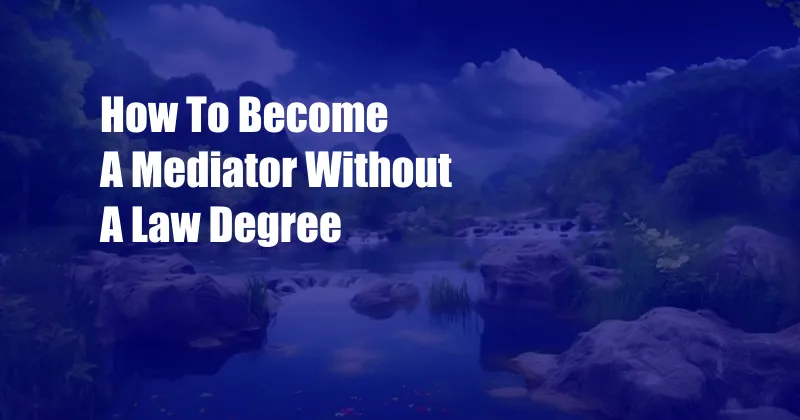
How to Become a Mediator Without a Law Degree
Are you interested in a career in dispute resolution but don’t have a law degree? You may be surprised to learn that you can still become a mediator without one. Mediation is a form of alternative dispute resolution (ADR) in which a neutral third party helps disputing parties reach an agreement. Mediators do not decide who is right or wrong, but rather help the parties to communicate their needs and interests so that they can find a mutually acceptable solution.
Numerous opportunities are available for individuals interested in becoming mediators. This article will provide you with a comprehensive overview of the field of mediation, including its history, definition, and meaning. We will also discuss the latest trends and developments in mediation and provide tips and expert advice for those interested in pursuing a career in this field.
What is Mediation?
Definition
Mediation is a form of ADR in which a neutral third party, known as a mediator, helps disputing parties reach an agreement. Mediation is a voluntary process, and the parties are free to leave the mediation at any time. The mediator does not decide who is right or wrong, but rather helps the parties to communicate their needs and interests so that they can find a mutually acceptable solution.
History
Mediation has been used for centuries to resolve disputes. The first recorded instance of mediation dates back to ancient Greece, where mediators were used to help resolve disputes between citizens. Mediation was also used in ancient Rome, and it was later adopted by the Catholic Church as a way to resolve disputes between its members.
Meaning
Mediation is a powerful tool that can be used to resolve a wide range of disputes. Mediation can be used to resolve disputes between individuals, between businesses, and between governments. It can be used to resolve disputes involving family law, employment law, and contract law. Mediation is a flexible process that can be adapted to meet the needs of the parties involved.
How to Become a Mediator Without a Law Degree
There are several ways to become a mediator without a law degree. One option is to take a mediation training course offered by a mediation organization. Mediation training courses typically cover the basics of mediation, including the mediation process, mediation techniques, and ethics.
Another option is to apprentice with an experienced mediator. This can be a great way to learn about mediation and gain valuable experience. As an apprentice, you will have the opportunity to observe mediations and assist the mediator with administrative tasks.
Once you have completed your training or apprenticeship, you can apply to become a mediator with a mediation organization. Mediation organizations typically have a set of requirements that mediators must meet, including education, training, and experience.
Tips and Expert Advice for Aspiring Mediators
Here are a few tips and expert advice for aspiring mediators:
- Get training. Mediation training is essential for anyone who wants to become a mediator. Training will teach you the basics of mediation, including the mediation process, mediation techniques, and ethics.
- Gain experience. The best way to learn about mediation is to gain experience. You can gain experience by volunteering with a mediation organization or by apprenticing with an experienced mediator.
- Network with other mediators. Networking with other mediators is a great way to learn about the field and find opportunities to mediate.
- Stay up-to-date on the latest trends and developments in mediation. Mediation is a constantly evolving field, so it is important to stay up-to-date on the latest trends and developments.
FAQs About Mediation
Here are some frequently asked questions about mediation:
- What is the difference between mediation and arbitration? Mediation is a voluntary process in which the parties are free to leave the mediation at any time. Arbitration is a more formal process in which the parties are bound by the decision of the arbitrator.
- What are the benefits of mediation? Mediation is a confidential, flexible, and cost-effective way to resolve disputes. Mediation can help to preserve relationships and improve communication between the parties.
- How do I find a mediator? You can find a mediator by contacting a mediation organization or by asking for referrals from your attorney or other professionals.
Conclusion
Mediation is a powerful tool that can be used to resolve a wide range of disputes. If you are interested in a career in dispute resolution, you do not need to have a law degree to become a mediator. With the right training and experience, you can become a successful mediator and help others resolve their disputes.
Are you interested in learning more about mediation? If so, I encourage you to contact a mediation organization or speak with an experienced mediator. They will be able to provide you with more information about the field of mediation and help you to get started on your path to becoming a mediator.